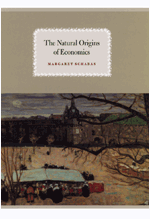Review: Schabas, The Natural Origins of Economics

The economy is ubiquitous in modern life. From the choice of what type of automobile we drive, to where we live, and which books we read, the economy influences nearly every decision we make. Yet, despite its importance to our daily lives, economists have often struggled to define the organizing principles behind its unpredictable behavior. In a recent review in the Times Literary Supplement David Thorsby praises Margaret Schabas’s The Natural Origins of Economics for its detailed look at the historical struggle to gain an intellectual perspective on the economy. A quote from the review:
Although early economic thinkers drew much inspiration from nature…the concept of the economy as an autonomous entity did not start to take shape until the first half of the nineteenth century. The transformation mirrored a transformation that was occuring in the political economy itself, from an intellectual discourse deriving its inspiration from the natural sciences to one oriented towards the behavior of individuals, in which nature was relegated to the sidelines.
Margaret Schabas’s fascinating book, The Natural Origins of Economics, charts the progress of this transformation, beginning not with Bacon and Descartes but with the origins of formal economics in the moral philosophy of the French Enlightenment. Schabas goes on to trace the influence of the natural sciences on the thinking of David Hume, Adam Smith and, in due course, on Ricardo, Malthus and other political economists of the early and mid-nineteenth century. She pays particular attention to John Stuart Mill, whom she sees as a turning point in what she calls the “denatralization” of the economic order.… He proposed an economy that was separated from the natural order, setting the stage for W. Stanley Jevons, F.Y. Edgeworth, Alfred Marshall and the other neo-classicals in the late nineteenth century. The “denaturalized” economics that these economists developed, where maximization of individual utility was paramount, where rational behavior reigned and where markets reached equilibrium, is still with us today.